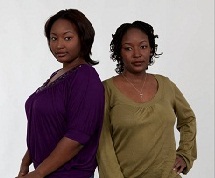Lesbian and bisexual women can
be at risk for STDs and these pages will direct you to
further information and to resources specifically geared
to assist with LGBT specific issues.
Do Lesbians need STD tests?
Yes!
It is untrue that lesbians are not at risk of STDs or
cervical cancer. In fact there is evidence that the rate
of STDs among women who have sex with women (WSW) is at
least as high as among heterosexual (straight) women.
Many lesbians have had sex with men in the past and may
be carrying STDs from previous male partners without
being aware of it. Some women who identify as lesbian
also have sex with men, putting them at risk for STDs. Even women who have only had female
partners get STDs.
Like all sexually active people, it is important to
get regular STD / HIV tests, especially if
you have more than one partner, a new partner, or think
that your partner may have other partners. It is also
important to get a check up any time that you have
symptoms of infection or if you find out that a sex
partner has an STD.
Do Lesbians need Pap Tests?
Yes! Human Papilloma Virus (HPV), abnormal PAPs and
cancer of the cervix (opening to the womb) have all been
seen in women who report that they never had sex with a
man. HPV, the viruses that can cause abnormal cells in
the cervix, can be transmitted between women. Regular
PAP tests are recommended for all lesbian and bisexual
women.
What STDs can be transmitted between women?
Some STDs such as herpes,
genital warts and
HPV are
transmitted by skin-to-skin contact between women. Other
infections such as
bacterial vaginosis (BV),
trichomonas
(trich), chlamydia and
gonorrhea can pass between women
in the vaginal fluid. There have also been reports of
HIV and
syphilis being transmitted between women. The
risk of transmission is greater during menstruation (a
period). The types of sexual behavior that carry
risk for STD transmission between women are listed
below, along with ways to reduce the risk of
transmission.
-
Oral-vaginal/vulval contact
Putting the mouth on the vagina or vulva can spread
STDs like herpes, syphilis and possibly gonorrhea.
Using dental dams or plastic wrap can reduce the risk.
-
Digital-vaginal contact
Putting fingers in the vagina can spread herpes, HPV
and bacterial vaginosis, trichomonas, chlamydia, and
gonorrhea if a woman is exposed to vaginal fluid from
an infected partner. Using gloves or finger cots can
reduce the risk.
-
Oral-anal contact area
Contact between the mouth or tongue and anus (butt)
can spread syphilis, herpes, hepatitis A and
intestinal (gut) infections. The risk of infection is
much higher in the partner who uses her mouth. Using
dental dams or plastic wrap can reduce the risk.
-
Genital-genital & genital-body contact
Contact can spread STDs such as HPV, pubic
lice (crabs) and herpes. Wearing clothes and for
herpes, avoiding contact if sores are present, reduces
the risks.
-
Insertive sex (using sex toys)
Sharing toys or dildos used in the vagina or anus can
spread trichomonas, chlamydia and gonorrhea, herpes,
HPV and possibly other STDs. The risk can be reduced
by using condoms or by not sharing toys.
-
Piercing and sadomasochistic activities (SM)
These activities can transmit HIV,
hepatitis B and C
if blood is shared. The risk can be reduced by the use
of clean needles and avoiding activities that cause
blood to be shared. Of these infections, vaccination
is only available for hepatitis B.
-
HIV transmission between women
You can find out more about
HIV
Risk for Lesbians, Bisexuals & Other Women Who Have
Sex With Women at GMHC.
Links and Resources
Places lesbian and bisexual women can go for HIV/STD
tests and Paps, and domestic violence resources:
-
The Los Angeles LGBT Center
Provides a broad array of services for the lesbian,
gay, bisexual, and transgender community. The Center
offers free and low-cost health, mental health,
HIV/AIDS medical care, HIV/STD testing, and prevention.
It also has an alternative insemination service. The
Center’s Audre Lorde Lesbian Health Program provides
cancer screening services including Pap smears, breast
exams, and mammograms for uninsured women who meet the
financial eligibility criteria. Call (323) 993-7500 or
e-mail healthservices@LAGayCenter.org for more
information. The Center also offers legal, social,
cultural, and educational services, with unique
programs for seniors, families and youth, including a
24-bed transitional living program for homeless youth.
-
LA County STD clinics
Offer free
STD and HIV tests. Some of these clinics offer Paps to
women getting STD testing. Call individual clinics to
inquire.
-
Planned Parenthood
Clinics and providers offer STD and PAP
tests. If you also need birth control, you may be
eligible for low or no-cost services under the Family
PACT program.
-
Gay and Lesbian Medical Association
Offers a tool to find a doctor who is GLBT friendly in
your area.
-
The Gay, Lesbian, Bisexual and Transgender
National Help Center
The center provides free and confidential telephone and
e-mail peer counseling, information and local resources.
Their toll-free National Hotline number is
1-888-THE-GLNH (1-888-843-4564). Information is also
available by e-mailing glnh@GLBTNationalHelpCenter.org.
There is also a toll-free Youth Talkline, run by young
people, for teens and young adults up to age 25.
1-800-246-PRIDE (1-800-246-7743)
youth@GLBTNationalHelpCenter.org
-
Domestic Violence
This
victim's handbook
 includes information, tips, and
resources if you are looking to escape violence in
your home.
includes information, tips, and
resources if you are looking to escape violence in
your home.